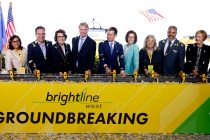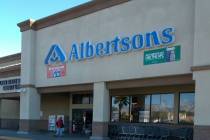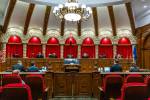Mining association sees Nevada tax question’s defeat as a slam dunk
CARSON CITY — The Nevada Mining Association is so convinced voters will defeat a mining tax question in November that it does not plan to wage a media campaign this fall to induce them to vote no.
“We will answer people’s questions,” said Tim Crowley, the association’s president.
The thinking in the industry is that the proposed 2 percent business margins tax question on the same ballot — also opposed by the Nevada Mining Association — will lose, and people who vote against it also will vote against the mining question.
Voters have not been quick to approve any higher taxes during a recession. Clark County voters soundly defeated a school construction question in 2012. Then last fall, commissioners in Clark and Washoe counties refused to pass higher taxes to hire police and to make school improvements, respectively.
With gold prices down and extraction costs up, Crowley expects voters will defeat a ballot question that would let the 2015 state Legislature adjust the 5 percent net proceeds of minerals tax rate now in the state constitution. Attempts to let legislators adjust this tax rate have failed in the past.
“There is a growing public awareness that we are an industry that produces the kind of high-paid jobs the state needs and are the type of industry that needs to thrive,” he said.
Average mining jobs in Nevada pay more than $83,000 a year. Most of these jobs are in Eureka, Elko and other rural counties.
For nearly a decade, the Progressive Leadership Alliance of Nevada has been harping that mining must pay a lot more in state taxes. Bob Fulkerson, PLAN’s state director, said the industry can pay double or triple what it now pays in net proceeds taxes.
The group’s argument has been that mining gets a tax break that no other industry in Nevada receives by having its tax rate in the constitution. While other taxes can be increased routinely by legislators, a tax rate in the constitution cannot be changed by legislators unless voters first pull it out of the construction. That process takes four years.
Voters in November will be given the chance to make that change.
In 2011, then-state Sen. Sheila Leslie, D-Reno, won approval of Senate Joint Resolution 15, which would let voters decide whether to take the tax out of the constitution. Then in 2013, as required under Nevada’s constitution, legislators approved it again, which put it on the Nov. 4 ballot.
With voter approval, legislators could change the tax rate whenever they chose. They already have that right with the state’s other major industry-specific tax, the 6.75 percent gross gaming tax.
Based on its battles in the Legislature to keep the tax in the constitution, PLAN’s Fulkerson does not believe the mining association will pass up on mounting a strong campaign to defeat the ballot question. Jim Wadhams, a veteran lobbyist who represents Newmont Mining, also believes a fall campaign is coming.
“They were kicking and screaming during the legislative session, and now they will become like lambs?” Fulkerson asked.
Both he and Leslie believe the mining question will win easily. They say Clark County voters, who feel shortchanged when it comes to state funding allocations, will vote big for the mining question and cancel out “no” voters in other parts of the state.
Fulkerson is counting on the accuracy of a Nevada State Education Association poll conducted in the fall. It found 54 percent of respondents favored the mining ballot question. Another 34 percent opposed it, and the rest were undecided.
“I don’t have it out for mining,” Leslie said. “Mining is always going through boom-and-bust cycles. The point of getting the tax out of the constitution is it would allow the Legislature to change the tax, tax more in good times, and in bad times tax less.”
GOLD’S LUSTer DIMMING
It is not the best or the worst of times for Nevada mining. Gold production in recent years has been about 5.5 million ounces, half of what it was in the late 1990s. An ounce of gold peaked at $1,900 an ounce in the fall of 2011 but fell to $1,187 just before Christmas 2013.
Since then, there has been about a 10 percent gain in the price of gold, selling at $1,325 an ounce Friday. When the U.S. economy is not doing well, gold increases in price. When the economy is improving, then gold usually falls.
The state Division of Minerals said in its 2012 Nevada mines report that the minerals industry that year received a record $10.5 billion in gross revenue, with gold averaging $1,668 an ounce. The division’s 2013 report is not yet completed, but Crowley expects it will show gross revenue has dropped substantially because of declining gold prices.
Kitco.com reported nationally that gold prices in 2013 averaged $1,411 per ounce.
What has hurt the Nevada mining industry’s future is that companies are doing less exploration because of the decline in gold prices, according to Crowley. He did not have exact figures for 2013, but the state Division of Minerals reported $580 million was spent on exploration in 2012.
“It takes hundreds of millions of dollars to develop a mine before any revenue or cash flows from it,” Crowley said.
Counting exploration, development of mines and extraction costs, Crowley estimated it now costs about $1,400 to produce an ounce of gold, which would mean mines would lose money if they sold gold at today’s trading prices.
Crowley’ assertions are backed by others.
ZeroHedge in a December story put the cost of producing an ounce of gold at $1,250 to $1,300. In June, Reuters quoted economists who said the cost of producing an ounce of gold was $500 in 2007 but climbed to $1,100 in 2011.
The era of prospectors finding chunks of gold with axes is long past. Nevada mines produce gold at fractions of an ounce per ton of ore. About 73 percent of the gold in the United States is produced in Nevada.
MINING: WE PAY TAXES, TOO
Crowley bristled over suggestions by Leslie that the mining industry receives a tax break by having the net proceeds tax in the constitution.
“Mining pays every tax every other business pays,” asserted Crowley, contending that in 2012 the industry paid a total of $431 million in taxes.
Besides sales, business and other taxes other industries pay, Crowley said mining also pays an additional tax that the others don’t, the net proceeds of minerals tax. This tax is paid not only to the state but to local governments in mining counties too.
The state Economic Forum projected that Nevada state government will receive $95 million in net proceeds of minerals taxes this year. Because of the drop in gold prices, net proceeds tax revenue dropped 22 percent from 2012 to 2013.
This is the figure that PLAN often attacks, noting it is a tiny fraction of Nevada’s $3 billion plus annual general fund budget and 1 percent of the industry’s state revenue.
Crowley noted that the Legislature in 2011 did boost net proceeds of minerals revenues by about $25 million a year. While the 5 percent tax rate cannot be changed because of the constitution, the Legislature can reduce the deductions the industry can take before the net proceeds tax is calculated. It took such action during the 2011 session.
Passage of the ballot question would not increase mining taxes. It simply would give the Legislature the option of raising or lowering the taxes. Under the approved Senate Bill 400, the taxes the mining industry pays in 2015, compared with 2014, will remain the same unless the Legislature acts.
Because any type of tax increase requires a two-thirds majority vote of each chamber in the Legislature, it is doubtful there will be enough votes to change the mining tax even if the ballot question passes. During the 2013 session, the resolution to put the proposal on the ballot passed 17-4 in the Senate but carried the Assembly 26-15, two votes less than a two-thirds majority.
Contact Capital Bureau Chief Ed Vogel at evogel@reviewjournal.com or 775-687-3901. Follow him on Twitter @edisonvogel.























